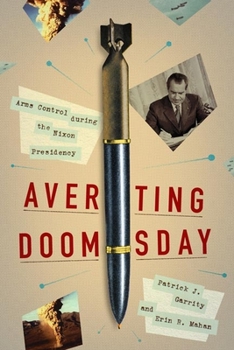Averting Doomsday: Arms Control During the Nixon Presidency
(Part of the Miller Center Studies on the Presidency Series)
In the controversial legacy of the Nixon presidency, the administration's effort to curb and control the spread of the world's weapons of mass destruction is often overlooked. And yet by the time President Nixon left office under the cloud of the Watergate scandal, his actions on this front had surpassed those of all his predecessors combined and laid the foundations of WMD arms control and nonproliferation policies that persist to this day.
In Averting Doomsday, Patrick Garrity and Erin Mahan explore and assess Nixon's record, addressing not only nuclear but also biological and chemical weapons. Drawing substantially on presidential recordings and other primary sources not widely consulted, the authors shed new light on milestones such as the first SALT agreement on strategic nuclear weapons and the Anti-Ballistic Missile Treaty, as well as the renunciation of US offensive biological weapons and a Seabed treaty. The WMD-control landscape had accumulated many divergent visions and interests over time--technical, diplomatic, domestic political, and utopian. The Nixon administration had to adjust to and build on this eclectic foundation, creating a new layer of policies to deal with WMD that substantially set the course--and perhaps limited the options--for future administrations in ways that are still with us.
Miller Center Studies on the Presidency





